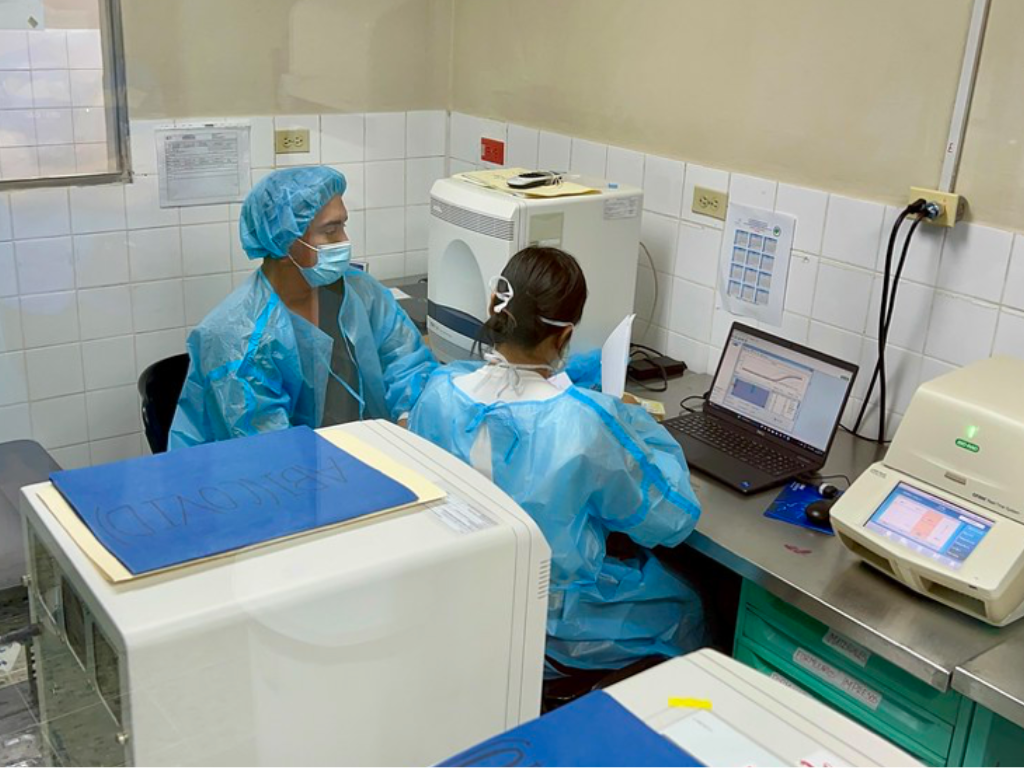
Panama, August 20, 2024 (PAHO)- The Virtual Campus for Public Health (VCPH) of the Pan American Health Organization (PAHO) and the Joaquim Venâncio Polytechnic School of Health (EPSJV), of the Oswaldo Cruz Foundation (Fiocruz), Brazil, with financial support from the Spanish Agency for International Development Cooperation (AECID), presented the results of the research titled "Human resources in health in the context of COVID-19: strengthening capacities to improve the response of health systems".
The purpose of the research was to analyze the profile and preferences of health technicians who participated in courses on the VCPH platform during the 2018-2023 period and thus being able to improve the educational offer and access to the VCPH, adapting it to the characteristics and needs of this group.
The International Network for the Education of Health Technicians (RETS) understands health technicians as all those who carry out technical and scientific activities in the health sector, from community health assistants and workers to higher-level technicians.
"With 21 years of existence, 3 million users and more than 7 million enrollments, one of the challenges of the Virtual Campus, from its technical cooperation perspective, is to increasingly reach those who are part of the health systems in our countries," stated Gabriel Listovsky, head of the Virtual Campus Special Program during the opening of the event. "There are no health systems without human resources and there are no human resources if the diversity of workers performing in the system is not considered”.
In addition, Listovsky highlighted the networking with institutions such as AECID, which he described as a strategic ally in terms of international cooperation. "This is the beginning of a path that we want to build together. Analyzing, discussing and making decisions on how to reach health workers in the region".
Oriana Ramírez Rubio, head of the health area of the AECID, referred to the priority role that Spain gives in terms of international cooperation to the countries of Latin America and the Caribbean, highlighting the long relationship of multilateral cooperation with PAHO. "Our country has been flying the flag of gender equality, the importance of the environment and climate change, but it is also concerned with strengthening public health institutions, from the perspective of universal coverage and the right of access to health".
Carlos Eduardo Batistella, coordinator of International Cooperation of the EPSJV, referred that the Polytechnic School was turning39 years old the day before the event and has been a PAHO Collaborating Center for the training of health technicians for 20 years.
"Since its creation, the EPSJV has been committed to working in the areas of education, research, communication and technological development to strengthen the training of health technicians. During the pandemic, the importance of having strengthened health systems capable of providing rapid and effective responses to health emergencies became even clearer to us. This implies improving the training of technicians in the sector who, despite being the basis of health systems, continue to be invisible," said Batistella.
Study results
Gabriel Muntaabski and Fernando Santoro, consultants in charge of the research, presented some considerations about the results of the study:
- Five countries account for 89.60% of the technical users of the Virtual Campus: Mexico (43.10%), Colombia (30.24%), Ecuador (9.85%), Argentina (3.39%) and Chile (3.03%). Most of the participants of the courses are Spanish-speaking and live in Latin America.
- Between 2018 and 2023, a total of 340,088 health technicians were registered on the Virtual Campus. A significant increase in users was verified during the pandemic (399%). In the post-pandemic period, growth remained at a lower rate (59%). Technicians represent 16.5% of total users in the post-pandemic period.
- Nursing is the main profession in the total number of users of the Virtual Campus and represents 78.8% of technical users in the post-pandemic.
- The 5 courses with the highest number of enrollments represent 41.8% of enrollments, the top 10 56.69% and the top 20 69.28%.
- The high level of certification of this universe of enrollments was noted (68.8% approval), which can be considered as an indirect indicator of the relevance and level adequacy of the courses chosen by this audience.
- The five most popular courses in the region are: Diagnosis and clinical management of dengue; Basic precautions: Hand hygiene; Fundamentals of palliative care; Implementation of the HEARTS package in Primary Health Care and Automatic Blood Pressure Measurement.
- In terms of age, the post-pandemic growth of those under 40 years of age is significant, as they now account for 59.3% of users (with a special growth of those under 20 years of age).
- The 79.6% of the technical personnel who are trained in the Virtual Campus identify with the female gender, which reflects the predominantly female composition of the health workforce.
- In relation to the workplace, the highest percentage of users work in hospitals (42.5%), followed by health centers (25%).
All the data processed for this study has been compiled in a dashboard that allows a simple visualization of the information.
Although there is no calculation base for the total number of technical professionals in the region, taking nursing personnel as a reference, it is considered that the Virtual Campus has a great potential for growth in the group of students and technical workers.
Second stage of the 2024-2025 research project
In the second stage of the project "Human resources in health in the context of COVID-19: strengthening capacities to improve the response of health systems (2024-2025)", it will seek to identify and characterize the groups of technical workers who work at the first level of care in Latin America. Likewise, the most effective pedagogical and technological strategies for this group will be identified and communication will be sought to facilitate access to the courses of the Virtual Campus, in accordance with the recommendations made in the first stage of the research.

